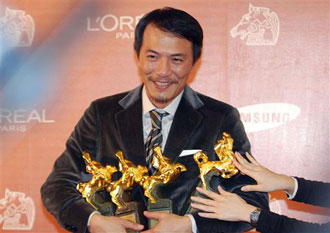Leon Dai Film Wins 4 Golden Horse Awards
Golden Harvest: A local director breaks a string of mainland winners.
Taiwanese social drama “No Puedo Vivir Sin Ti” won Chinese cinema’s top honor on Saturday — a rare victory for an industry that has been overshadowed by big-budget blockbusters from rival mainland China.
While this self-ruled island that split from China in a 1949 civil war has produced world-class directors like Oscar winner Ang Lee and art-house standouts Edward Yang and Hou Hsiao-hsien, a younger generation of filmmakers have struggled to produce commercial hits. Meanwhile, China’s movie market has been booming, churning out lavish historical epics that have drawn talent from Taiwan and Hong Kong.
But the tables were turned at least for one night Saturday, when a Taiwanese black-and-white film about a working-class single father who struggles to retain custody of his daughter clinched best picture and best director at the Chinese-language equivalent of the Oscars. Leon Dai’s “No Puedo Vivir Sin Ti” also won best original screenplay and outstanding Taiwanese film of the year at the 46th Golden Horse Awards.
While the annual event is held in Taiwan, it is Chinese film’s most representative award, drawing jurors from Taiwan, Hong Kong and mainland China.
“I especially want to thank this piece of land, Taiwan. It’s this land that nurtured this movie. And we have been working hard to use the nutrition we received to develop this land,” Dai told reporters backstage.
Oscar best director winner Lee, who is now based in the U.S., was on hand to witness the rare triumph of his home industry. Lee, whose first three films were made by then state-run Taiwanese film company, Central Motion Picture Corp., presented Dai with his best director trophy along with Hou and Hong Kong directors Johnnie To and Stanley Kwan.
Not only did Dai direct “No Puedo Vivir Sin Ti,” he also produced, edited and wrote the screenplay — highlighting the difficulty Taiwanese filmmakers face in raising funds.
The best actor competition produced the first tie in the Golden Horse Award’s history, with jurors honoring both Hong Kong actor Nick Cheung and his Chinese counterpart Huang Bo. Cheung played a former boxer who takes a kidnapping job so he can care for his sick wife in “The Beast Stalker.” Huang played a man in “Cow” who tries to protect a dairy cow from Japanese soldiers who wiped out his fellow villagers in 1940s China.
Cheung, who also won best actor at the Hong Kong Film Awards earlier this year, told Huang backstage that he considered him a great rival after watching his performance and thought the tie was “the perfect ending.”
Huang said his was a difficult four-month shoot, with many scenes involving more than 100 takes, and jokingly thanked his co-star — the cow.
“I still want to thank my baby — my big dairy cow. I will give you some good feed when I get back,” he said.
Best actress went to China’s Li Bingbing for the thriller, “The Message,” about Japanese invaders in China who try to ferret out a spy among their Chinese collaborators. Li edged out co-star Zhou Xun.
A tearful Li rambled on during her acceptance speech despite being cued by background music to wrap up twice.
“There were no easy scenes in this movie. If you wanted to take it easy or let your form slip in a scene in the movie, you didn’t have the chance to do so. This is a very serious movie. It doesn’t allow you any margin of error,” she said.
Veteran Hong Kong star Wai Ying-hung won best supporting actress for playing a single mother whose son faces rape charges in “At the End of Daybreak.” The best supporting actor was China’s Wang Xueqi, who portrayed an elderly performer in Chen Kaige’s biopic of late Peking Opera star Mei Lanfang, “Forever Enthralled.”
“KJ: Music and Life” was a surprise winner of three awards. The documentary of a Hong Kong music prodigy won best documentary, best editing and best sound effects.
“The Golden Horse Awards jurors are sending us a message that documentaries can compete with feature films from a technical standpoint,” director Cheung King-wai, a former professional cellist, said.
The lifetime achievement award went to retired Central Motion Pictures general manager Ming Ji, who oversaw the company’s transition from a producer of military propaganda and anti-communist films to an incubator of Taiwanese talent like Lee, Yang and Hou. Ninety-two year old actor George Wang, whose 55-year career spanned his native Taiwan, Italy and Hollywood, was presented the special contribution award.
11/28/2009 12:19 PM MIN LEE, AP Entertainment Writer BANCIAO, Taiwan

Taiwanese director Leon Dai holds his four awards include Best Director and Best Feature Film at the 46th Golden Horse Awards, Saturday, Nov. 28, 2009, in Banchiau, Taipei County, Taiwan. (AP Photo/Chiang Ying-ying)

